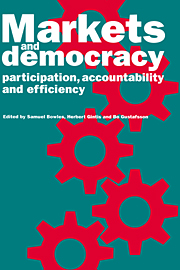Book contents
- Frontmatter
- Contents
- List of figures
- List of tables
- Preface
- 1 Post-Walrasian political economy
- Part I Agency, incentives, and democratic accountability
- Part II Institutions and institutional change
- 4 Toward a framework for analyzing institutions and institutional change
- 5 Imperfect choice and rule-governed behavior
- 6 Organizational equilibria and institutional stability
- 7 Agency problems and the future of comparative systems' theory
- Part III Conditions for the success of the democratic firm
- Part IV Productivity, distribution, and power
- Part V Ownership, participation and capital markets
- Part VI Political democracy and economic democracy
- Bibliography
- Author index
- Subject index
7 - Agency problems and the future of comparative systems' theory
Published online by Cambridge University Press: 05 March 2012
- Frontmatter
- Contents
- List of figures
- List of tables
- Preface
- 1 Post-Walrasian political economy
- Part I Agency, incentives, and democratic accountability
- Part II Institutions and institutional change
- 4 Toward a framework for analyzing institutions and institutional change
- 5 Imperfect choice and rule-governed behavior
- 6 Organizational equilibria and institutional stability
- 7 Agency problems and the future of comparative systems' theory
- Part III Conditions for the success of the democratic firm
- Part IV Productivity, distribution, and power
- Part V Ownership, participation and capital markets
- Part VI Political democracy and economic democracy
- Bibliography
- Author index
- Subject index
Summary
Introduction
Recent events in the (former) Soviet Union and Eastern Europe have awoken the field of comparative economic systems from its quiet backwater. Spurred by the delegitimation of an undemocratic system which no longer delivered the goods, these changes challenged standard comparative systems' assumptions of placid, obedient workers, and unchanging economic and political systems.
The economic problems result from the inherent “shortage” character of centrally planned economies (CPEs) (Kornai, 1982), which causes input hoarding by managers, unfulfilled plans and a shortage of consumer goods, in turn weakening work incentives. The problems are also linked to the paternalistic, and often corrupt, nature of the state, which failed to represent citizens (Nove, 1983).
Underlying these failures are agency problems between owners and managers, between managers and workers, between producers and consumers, and between the state and citizens. These same four types of agency problems are common to all economies, although the specific forms they take in CPEs result from the particular institutional structures of these societies.
In spite of the importance of agency problems in CPEs, the agency-theoretic approach is conspicuously underdeveloped in the field of comparative economic systems. The dominant paradigms in the field have examined only one agency problem closely, the principal–agent problem between planners and managers. Other agency problems have rarely been addressed. Further, the planner–manager problem has been examined exclusively in the context of comparing problems arising under state ownership and central planning to that of an ideal market economy in which agency problems are assumed away.
- Type
- Chapter
- Information
- Markets and DemocracyParticipation, Accountability and Efficiency, pp. 116 - 126Publisher: Cambridge University PressPrint publication year: 1993
- 1
- Cited by



